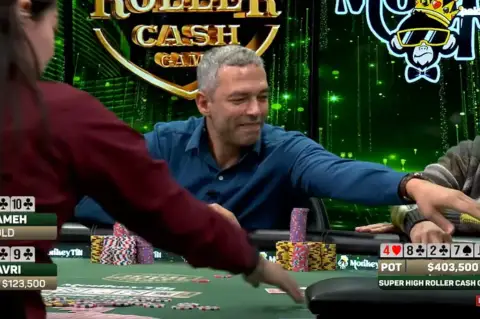Think your poker game is airtight? Even seasoned pros fall into surprising traps that can cost them big. From misjudging bluffs to emotional decision-making, these common mistakes could be holding you back. Are you making them too?
Overestimating Bluffing Power
Bluffing is an essential part of poker, but relying on it too much can be a costly mistake. Many players, even experienced ones, fall into the trap of thinking that frequent bluffs will keep their opponents guessing. In reality, skilled players are quick to recognize patterns and will call your bluffs if they sense weakness. Over-bluffing can drain your bankroll and undermine your credibility at the table. The key to successful bluffing is choosing the right moments and opponents. Pay attention to how your opponents play. Cautious players who fold easily are better targets for a bluff, while aggressive players are more likely to call and challenge your hand. Timing and observation are crucial. Bluff when the situation favors you, such as when the community cards suggest a strong hand, and avoid bluffing just for the sake of it.
Mismanaging Bankroll
Poor bankroll management is one of the most common reasons even skilled poker players face heavy losses. Without a clear strategy for handling their funds, players can quickly find themselves out of money, especially during losing streaks. Some players risk too much of their bankroll on a single game, while others chase losses, hoping to recover quickly. Both habits can lead to financial trouble and emotional decisions that further harm their game.
To avoid these pitfalls, it is essential to set clear limits and stick to them. A general rule is to risk only a small percentage of your total bankroll on any given hand or tournament — typically no more than 5%. This approach helps you survive inevitable downswings while maintaining enough funds to play strategically. Additionally, separate your poker bankroll from your everyday finances to ensure you are never playing with money you cannot afford to lose.
Investing in tools like a bankroll management app or even a quality poker set for home games can help you practice and refine your skills. You can also find poker sets to set up your own practice environment. Managing your bankroll carefully and staying disciplined increases your chances of long-term success at the poker table.

Ignoring Position Strategy
Position is one of the most important factors in poker, yet many players overlook its impact on their decision-making. Where you sit relative to the dealer determines how much information you have before acting. Players in later positions get to see how others bet before making their own decisions, giving them a significant advantage. In contrast, players in early positions must act with little information, increasing the risk of making costly mistakes.
A common error, even among experienced players, is playing too many hands from early positions. This approach leaves you vulnerable to aggressive plays from those acting after you. To improve your poker position strategy, play tighter when you are one of the first to act, focusing on strong hands. In later positions, you can expand your range and take advantage of the information gained from other players’ actions. Understanding and using position to your benefit allows you to make better decisions, control the pot, and maximize your winnings.
Underestimating Opponents
Underestimating opponents is a mistake that can lead to costly missteps, even for experienced poker players. It is easy to assume that less-skilled players are predictable or easy to beat, but this mindset can be dangerous. Amateur players often make unconventional moves that defy standard poker logic, making them harder to read. Misjudging their actions can result in overconfidence, poor decision-making, and unexpected losses.
To avoid this trap, pay close attention to how each opponent plays rather than relying on assumptions. Adjust your strategy based on their tendencies. Against aggressive players, adopt a tighter approach and wait for strong hands to capitalize on their mistakes. Against passive or cautious players, use selective aggression to push them out of pots. Stay flexible and adapt your strategy to the skill level and behavior of your opponents. This way, you can avoid being caught off guard and maintain control over the game.
Emotional Decision-Making (Tilt)
Emotional decision-making, often called “tilt,” is one of the biggest obstacles to consistent success in poker. When emotions take over — whether due to a bad beat, a losing streak, or frustration — your ability to think clearly and make rational decisions is compromised. Many players on tilt become overly aggressive, chase losses, or make impulsive bets without considering the odds. This emotional response can quickly escalate losses and create a cycle where frustration leads to even riskier decisions.
To prevent tilt, it is important to develop techniques for staying calm and maintaining a strategic mindset. One effective approach is to take breaks when you feel emotions rising, giving yourself time to reset and regain focus. Practicing mindfulness or deep breathing exercises can also help manage stress during tense moments. Setting strict loss limits before you play can prevent emotional overreactions and keep your decision-making logical. Practicing these techniques while playing BetMGM poker can help you refine your emotional control in real time. By staying composed and disciplined, you can make better decisions and protect your bankroll from the costly effects of tilt.

Master Your Poker Game
Even the most seasoned poker pros fall into these common traps, but the key to overcoming them is awareness. Recognizing where you may be going wrong is the first step toward improving your strategy and enhancing your game. Take the time to evaluate your decisions, adjust your approach, and sharpen your skills. With practice and a focus on smart, disciplined play, you can avoid these mistakes and take your poker performance to the next level.














